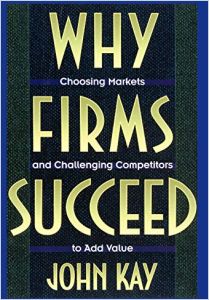Why Firms Succeed
Contents:
50 Reasons Why Some Businesses Fail While Others Succeed
Kay, using specific examples of success and failure in the American market, identifies and discusses four key ingredients to achieving this success: The Financial Times hailed it as "a powerfully argued book, which casts a fresh light on a range of practical business challenges. Kay is currently the best management theorist in Britain, bar none He is a rare find. In this freshly revised volume, Kay applies his groundbreaking theories to the U.
For too long, he writes, managers have chased after the latest fad in business planning and strategy, beguiled by military analogies and the demand for overarching vision.
When John Kay's Foundations of Corporate Success first appeared in the U.K., it commanded the attention of the corporate world--and drew widespread praise. Editorial Reviews. From Booklist. Kay is a professor of economics at the London Business Why Firms Succeed - Kindle edition by John Kay. Download it once.
Success, he believes, should not be measured by organizational size or market share, but by the added value--the amount that output exceeds the input of raw materials, payroll, and capital. Corporate strategy should be aimed at this basic goal, beginning with the question, "How can we be different?
Success comes not when managers drive through a towering vision of the company's destiny, but when they act on their organization's specific capabilities and advantages--especially in the key area of architecture. Honda, he notes, captured a third of the American motorcycle market within five years.
See a Problem?
No vision was required for this success, he writes: Honda simply did what it did best making a simple, inexpensive product , followed by careful attention to the architecture of its business ties to distributors, customers, etc. He ranges through industries from airlines to retail clothing, pointing out the reasons for successes and failures.
But those 60 data points paint a revealing picture of flaws in law firm partnerships as a business model and invite a new approach to law firm management. This study is not an autopsy of failure, but a prescription for success. Sanjay Bakshi added it Jul 14, I recommend you read Failing Forward: It is impossible to have a broad strategy on a startup budget.
Kay also draws on game theory to underscore the importance of stable, long-term relationships. Other writers have hit upon some of these points, the Financial Times noted: To see what your friends thought of this book, please sign up.

To ask other readers questions about Why Firms Succeed , please sign up. Lists with This Book. This book is not yet featured on Listopia. Liwen Zan rated it it was amazing Nov 27, Jason Orthman rated it really liked it Jan 08, Ken Hilton rated it it was amazing Dec 28, Smith rated it liked it Jul 07, Eugene added it Apr 22, Subhadip added it Feb 14, Kevin Wheeler added it Sep 18, Martin Bloom marked it as to-read Aug 28, Ethan marked it as to-read Oct 29, Jonalyn Bumatay marked it as to-read Jul 25, Warren marked it as to-read Aug 30, Sanjay Bakshi added it Jul 14, Simon Dzialo marked it as to-read Oct 23, Ujjual Baburaj marked it as to-read Oct 29, Harihara marked it as to-read Jan 25, CCI added it Mar 24, Michael Raemmler marked it as to-read Apr 07, Prashanth Jnanendra marked it as to-read Apr 08, Venkatesh Krishnamurthy added it Apr 15, Rahul Chowdhury marked it as to-read Jun 16, Harsh Thaker marked it as to-read Jun 20, Deepak marked it as to-read Aug 03, Amber marked it as to-read Nov 05, Steve marked it as to-read Dec 16, Richard marked it as to-read Feb 19, Adam marked it as to-read Mar 10, Chris Stevo marked it as to-read May 20, Sumit marked it as to-read Jul 11, Lakshmanan marked it as to-read Jul 11, KM marked it as to-read Jul 20, Ethan marked it as to-read Aug 23, Matthew marked it as to-read Sep 11, Sohil Gupta marked it as to-read Feb 06, Vishal singh marked it as to-read Feb 07, There are no discussion topics on this book yet.
- Strugglebook: A Logical Search for the Truth of GOD.
- Why Firms Succeed.
- SAP R/3 Implementation: Methods and Tools (SAP Excellence).
- Bildung neu denken! Das juristische Konzept (German Edition)!
- CounterBank.
- Also Available As:?
I was born in Edinburgh, Scotland in , and completed my schooling and undergraduate education in that city: I am fortunate to have lived most of my life in beautiful places. I went to the University of Edinburgh to study mathematics. But, after taking a subsidiary course in economics, I decided that I wanted to be an economist. The notion that one might understand society better through the ap I was born in Edinburgh, Scotland in , and completed my schooling and undergraduate education in that city: The notion that one might understand society better through the application of rigorous and logical analysis excited me — and it still does.
I worked there under James Mirrlees, who was in due course to win the Nobel Prize for his contributions to economic theory. Oxford is a collegiate university — members of the faculty generally have both University and College appointments.
- Chromatography and Separation Science: 4 (Separation Science and Technology)
- The Sexual Question A Scientific, psychological, hygienic and sociological study
- Umbelliferae
- Participatory Journalism: Guarding Open Gates at Online Newspapers
- Cooking Light, Salads Done Right (Mother Rimmys Cooking Light Book 3)
- Twice the Citizen